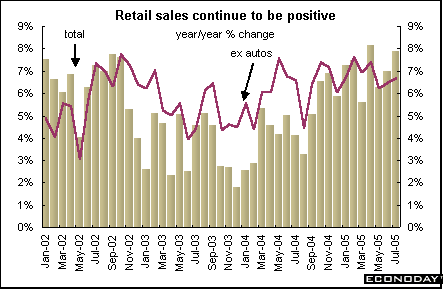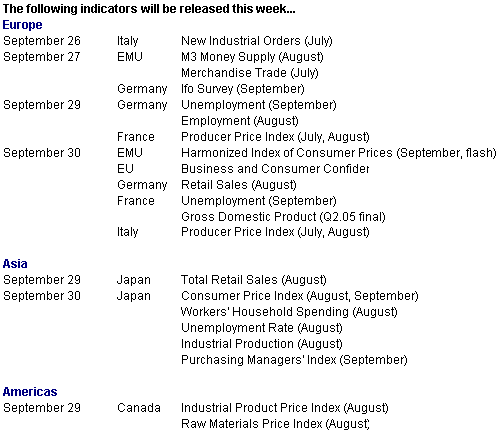Monday, September 26, 2005

Global markets coped with the probability of another major hurricane in the Gulf of Mexico along with a storm of political uncertainty in Europe. Market analysts became meteorologists as they tried to predict when and where hurricane Rita would make landfall. With the storm currently aimed at the Texas coast and the refineries there, equities wobbled and concerns about energy supplies upset investors. When the storm was downgraded to "only" a category 4 storm - the same strength as Katrina - equities rallied and crude prices were down. Earlier in the week, oil prices were barely affected by OPEC's decision to lift production quotas and produce as much crude as possible given the problems in the Gulf of Mexico.
The Federal Reserve Open Market Committee met on Tuesday and did the expected - they continued their long string of gradual 25 basis point increases to the fed funds rate. The rate now stands at 3.75 percent. As a result, the spread between U.S. and UK interest rates narrowed to 75 basis points while the gap with the EMU widened to 175 basis points. The spreads between the U.S. and other major countries impacts the desirability of U.S. assets. Some U.S. politicians had called for a "compassionate" pause in rate increases - a request that was bound to stir the Fed's independence genes and harden its resolve to follow its own path. Fed watchers were surprised that the word 'measured' was not removed from its post-meeting announcement. They were also surprised that the vote to continue the rate increases was not unanimous. Rather one Board member voted against the move. The minutes of this meeting will be parsed even closer than usual! The Board of Governors currently has two vacancies. Former member Ned Gramlich retired while Ben Bernanke moved to the Council of Economic Advisers.

Global Stock Market Recap

Europe and the UK
Energy and politics were the main influences on European investors last week. Political turmoil in two of the three big European Union countries did not help investor confidence. Investors dislike uncertainty to put it mildly. In Germany, the national election ended with no clear winner and there is no clear end in sight as both incumbent Gerhard Schroeder and challenger Angela Merkel refuse to give an inch. It is expected to take weeks to resolve the leadership question as both claim victory. This was truly the worst of all possible outcomes as prospects for critically needed reforms fade.
And then there is the on-going crisis in Italy surrounding Bank of Italy president Antonio Fazio who is under attack for his role in discouraging bank mergers with non-Italian banks. Unlike most central bank presidents, the president of the Bank of Italy does not have a specified term but serves until he chooses to step down. Last week the economy minister, the highly regarded Domenico Siniscalco, resigned in disgust over the situation. He was replaced by former economy minister Giulio Tremonti who also is anti-Fazio. Embattled Prime Minister Silvio Burlusiconi called on the European Central Bank to help depose Fazio, who was attending the Group of Seven Finance Minister and Central Bank Chair meeting in Washington. Later Burlusiconi asked Fazio to resign directly.

The CAC and DAX were both down last week while the FTSE managed to edge upwards. Besides the political confusion, the approach of hurricane Rita in the Gulf of Mexico promised tighter supplies as off-shore rigs and refineries along the Texas/Louisiana coast shut ahead of the storm. When Rita "weakened" to a category 4 storm from category 5, stocks rallied. It seems investors have short memories - Katrina was also downgraded before hitting land.
Asia/Pacific
Unlike the outcome in Germany, Japan's election produced a clear winner and equities celebrated the news. And the victor, Prime Minister Junichiro Koizumi, plans to move rapidly to pass his post office restructuring plan. He will use the strong mandate to accelerate privatization of the financial services sector by restructuring and eventually abolishing eight state-owned banks. In November, Koizumi is expected to announce a plan to reform government-affiliated banks by 2008. This is a clear sign that he plans to exercise his authority and push reform beyond privatization of the post office. Japan's state-owned banks generally raise money by issuing government guaranteed bonds and making long-term, low-interest loans to corporations involved in areas such as urban redevelopment. They have often been used to channel cheap funds to construction companies and other firms with connections to the government or bureaucracy.

At week's end, exporters' stocks took the brunt of worries about hurricane Rita's impact on U.S. spending as the storm looked to wipe out businesses and homes on the Gulf coast. Despite this concern, only stocks in Singapore were down on the week.
Currencies
The big news in the currency markets came on Friday when the People's Bank of China announced that it would allow the yuan to strengthen by as much as 3 percent from a daily fixed rate against the euro, up from 1.5 percent previously. It kept the range against the dollar unchanged. The euro was already down as the spread between European and U.S. interest rates widened to 175 basis points after the fed funds rate climbed to 3.75 percent on Tuesday. Coincidently, China's move came on the same day that finance ministers from the Group of Seven industrial nations were meeting in Washington. China may face continued pressure to allow its currency to appreciate further after Japanese Finance Minister Sadakazu Tanigaki said China's move wasn't vital but rather technical. A stronger yuan would boost Chinese consumers' purchasing power for imports from Asia and make the country's exports less competitive against regional rivals. The euro was also hurt after Germany's national election ended in a stalemate and Italian Economy Minister Domenico Siniscalco resigned.

Indicator scoreboard
EMU - July seasonally adjusted industrial orders were down 1.6 percent but up 1.2 percent when compared with last year. Industrial orders were up 3.8 percent and in the Netherlands by 2.7 percent. But order declines in France, Belgium, Ireland and Portugal more than offset the increases.
Germany - August producer prices were up 0.3 percent and 4.6 percent when compared with last year. The cost of mineral oil products was up 3.5 percent from July. However, the Statistics Office said that the increase in oil prices caused by Hurricane Katrina had not yet been taken into account. Excluding energy, producer prices rose by 1.4 percent on the year.

September ZEW confidence index dropped to 38.6 from 50 in the prior month. The index, which was significantly below the long-term average, only reflected the election results in part. Every month, more than 300 analysts and institutional investors respond to the ZEW survey. Those surveyed are asked to give their medium-term expectations for the economy and the capital markets. According to ZEW, they received about 50 replies after Sunday's vote. It received 309 replies in total. Surging oil prices also weighed on economic sentiment. Nevertheless, analysts were more upbeat about the current economic situation, as the respective indicator rose to minus 58.1 points from minus 61.1 points in August.

France - July consumer spending on manufactured good was up 1.2 percent and 3.6 percent when compared with last year. For August, spending was up 1.9 percent and 5.7 percent on the year. Typically the two summer month's data become available in September. All components with the exception of July auto sales were up in the two months.

Italy - Second quarter unemployment rate dropped to 7.7 percent from 7.9 percent in the first quarter. The number employed was up 0.4 percent with the biggest increase in the construction sector. Istat said the adjusted employment rate climbed to 57.7 percent in the second quarter from 57.1 percent in the first quarter. The largest decrease in employment was in the agricultural sector but employment was up in the service sector. Employment increased all over Italy except in the North. Due to a strike by Istat employees, the Italian data were released at 1030 GMT instead of the scheduled 0730 GMT. The strike was over contract renewals.

July world merchandise trade surplus was €2.4 billion after recording a deficit in June. Exports were up 3 percent while imports soared by 6.6 percent thanks to energy.

July retail sales were down 0.3 percent and dropped 2.1 percent when compared with last year. Sales were down for both food and non-food categories. Food accounts for over 39 percent of total sales. These data are not closely watched by analysts because they show little correlation to quarterly consumer spending in GDP accounts.

Asia
Japan - August seasonally adjusted merchandise trade surplus was ¥614.7 billion. Exports were up 2.9 percent but imports were up by 3.1 percent. On the year, exports were up 9.1 percent while imports soared 21.1 percent. The trade surplus has been shrinking as imports rise faster than exports because of higher prices of oil and steel, the country's major imports. Exports have slowed because of weaker demand from China and declining prices of many electronic products such as mobile phones, flat-screen TVs and DVD players.

July tertiary activity index dropped 0.8 percent but was up 1.3 percent when compared with last year. The tertiary index is closely watched because the service sector employs more than half of the Japanese workforce, and spending on services such as retailing, dining and travel is closely tied to changes in income and consumer confidence. The tertiary index reflects activity in the following service industries - utilities; transport; telecommunications; wholesale and retail; finance and insurance; real estate; restaurants and hotels; medical, health care and welfare.

July all industries index was down 0.8 percent and up 0.8 percent when compared with last year. The all industry index takes a reading of activity in the industries that comprise the tertiary index combined with activity in the construction, agricultural and fisheries industries, the public sector and industrial output. This index is considered a close approximation for gross domestic product growth as measured by industrial and service sector output.

Americas
Canada - August consumer price index was up 0.4 percent and 2.6 percent when compared with last year. Core CPI which excludes food and energy was up 0.2 percent and 1.5 percent on the year. The Bank of Canada core CPI, which excludes eight most volatile index items, was up 0.2 percent and 1.7 percent on the year. August gasoline prices jumped 6.6 percent while fresh vegetables declined 5.3 percent.

July retail sales were up 1.5 percent and 7.9 percent when compared with last year. Excluding auto, recreational vehicles and auto parts, sales were up 0.7 percent and 6.7 percent on the year. Auto sales jumped 3.6 percent. Sales were also up for food, beverages, pharmacies and furniture & home furnishings.

Bottom line
After a relatively quiet week for data, the action picks up over the next several days. The combination of new economic data and the end to the third quarter should keep investors busy. Investors will also be assessing the damage from Rita along the Gulf coast - its effect on gas prices and the tab for repairs.
Looking Ahead: September 26 through September 30, 2005




